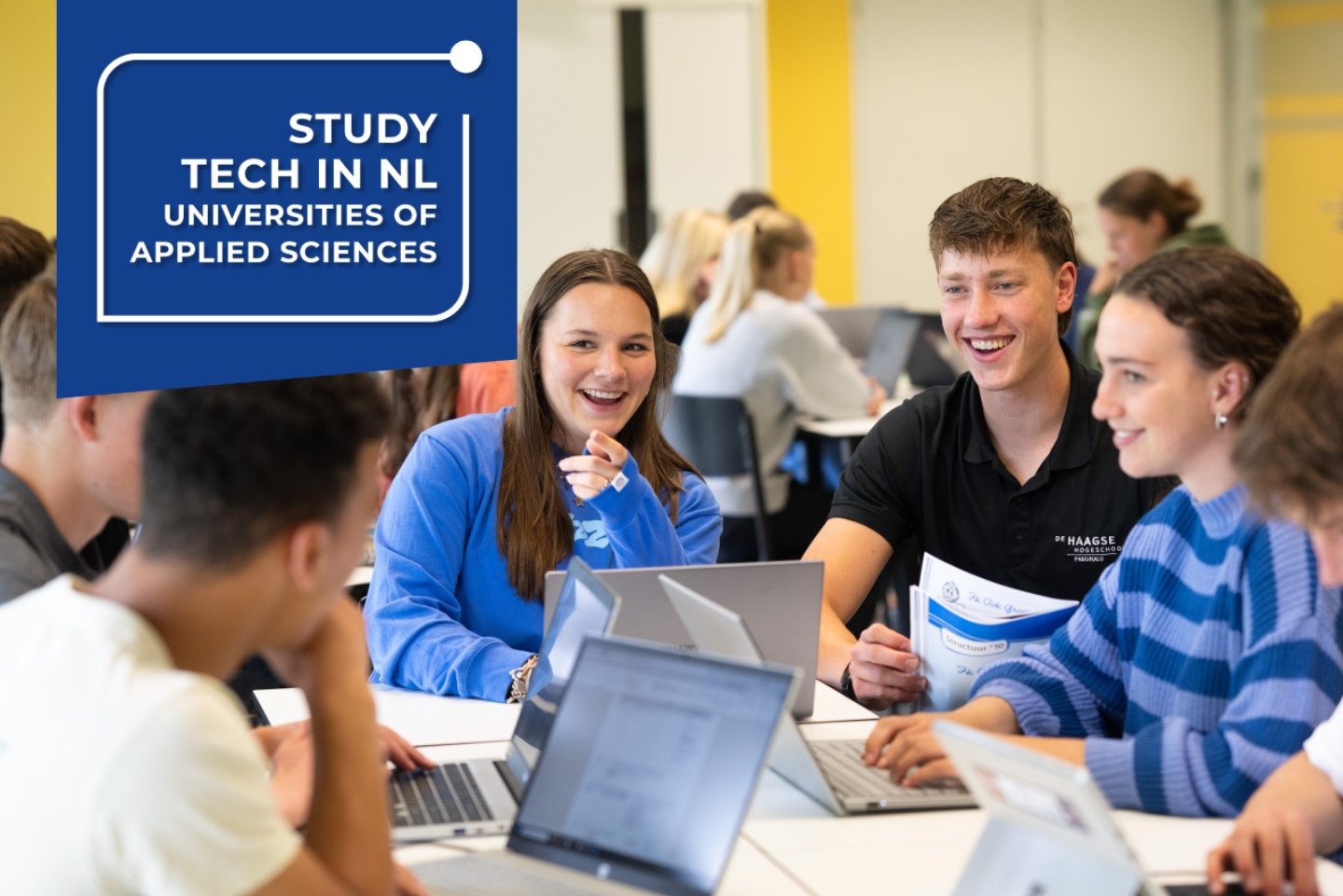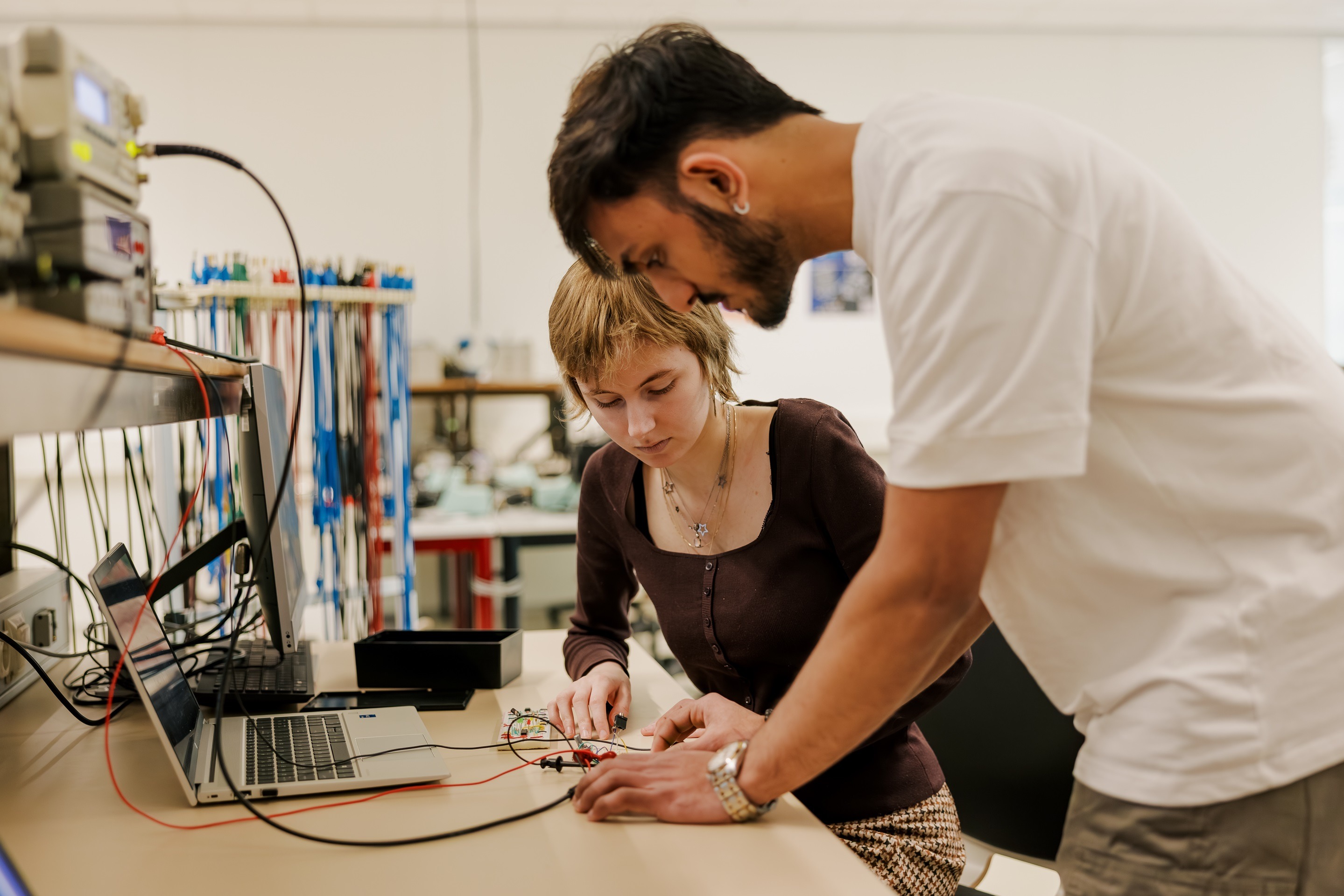For you?
Are you an ambitious techie, a curious creator or a determined innovator? Enthusiastic about smart systems and microelectronics? In the three-year Bachelor’s in Electrical and Electronic Engineering Degree Programme in Delft, you will learn to design and collaborate on high-tech innovations that help move the world forward.
This English-taught degree programme at The Hague University of Applied Sciences focuses on the technological challenges of tomorrow. Think of microchips, sustainable energy and intelligent hardware solutions that are vital for applications such as artificial intelligence, chip machines and the energy sector.
You will work closely with students from all over the world, while building your international future at the same time. In multidisciplinary teams, you will tackle real-world issues, often in collaboration with businesses such as ASML or other businesses in the semiconductor industry.
What makes this degree programme unique? It is the only three-year English-taught bachelor’s degree programme in Electrical Engineering in the Netherlands. You will learn through practice, within a close-knit community with inspiring lecturers, and in collaboration with leading businesses. This allows you to discover not only the power of technology, but also the strength of collaboration across borders.
By the end of your studies, you will not only have extensive technical knowledge, but also hands-on experience with real projects, teams and businesses. This prepares you for the challenging future of tomorrow and equips you to create solutions that make life easier and the world a better place! Positive energy guaranteed!
Admission requirements
Admission requirements
| Preliminary education | Required profile |
|---|---|
| Havo (senior general secondary education) | Does not qualify for admission |
| Vwo (pre-university education) |
|
| Mbo (senior secondary vocational education and training) | Does not qualify for admission |
You can also follow this programme alongside your work (as a Dutch-language part-time programme) or as a Dutch-language fulltime programme. The admission requirements may differ.
English proficiency
Good command of English language and proficiency.
English Academic Preparation Programme
Need help with your English? If you haven’t quite reached the right level of English for your chosen Bachelor’s or Master’s degree programme, you can enrol for English Academic Preparation Programme. After the successful completion of this programme, you’ll be ready to start your degree at THUAS and you will already have a good taste of studying and living in the Hague.
Heb je twijfels over je wiskundeniveau?
Twijfels over je wiskundeniveau?
Je gaat een technische opleiding doen waar wiskunde een onderdeel van is. Heb je de wiskunde-toelatingseisen voor de opleiding gecheckt? Daar moet je sowieso aan voldoen.
In sommige situaties – als je van het mbo* komt of als je op de havo wiskunde A hebt gedaan – is het verstandig om je wiskundekennis bij te spijkeren voordat je aan de opleiding begint. Dat kun je doen door bijvoorbeeld één van de wiskundecursussen te volgen die wij binnen De Haagse Hogeschool aanbieden. Lees hier meer over deze wiskundecursussen. Wil je liever zelf aan de slag en advies krijgen over hoe je dat kunt aanpakken, mail dan naar [email protected].
*Doe je nu een mbo-opleiding? Ga dan na of je het keuzedeel ‘hbo-wiskunde voor de techniek’ kunt doen.
Don’t meet the entry requirements?
You may not be directly admissible to the Electrical and Electronic Engineering Degree Programme. For example, if you do not have a suitable prior education, or if you have not taken your examination in a compulsory subject. Please check here which options are available to start your studies at THUAS after all.
You have a foreign or international diploma
With a foreign or international diploma you may be admitted, provided that this diploma qualifies you for higher professional education (hbo) and you can demonstrate sufficient proficiency in the English language. All foreign and international diplomas are evaluated by The Hague University of Applied Sciences.
Decisions regarding your qualification for admission
There are no exceptions to the official admission requirements. The Enrolment Office is the only party that can make decisions regarding your qualification for admission based on official regulations. You can’t rely on any other sources of information for your qualification for admission.
Programme content
What will you study each year?
Working methods
Lectures
In the first years of your Electrical Engineering degree programme, you will build a strong knowledge base by attending lectures and tutorials. These will be taught either by your own lecturers or guest speakers from professional practice. For example, you can attend a guest lecture from a specialist in wind energy or from professionals with expertise in electric drives and data networks. Lectures with multiple classes are rare. Much more often, classes consist of a group of 30 students.
Practicals
The theory you learn during lectures and self-study is directly applied in practice through practicals. Here you will sit in smaller groups in a practice room, and work alone or in pairs, using the latest equipment. The instructions are subject-specific and concise. So even if you have dyslexia, all instructions can be followed easily!
Projects
The knowledge you gain in lectures and during practicals is essential for your projects. Together with 2 to 6 fellow students, you carry out assignments. Sometimes these are fictional cases, but often they are real assignments for businesses. Often, you design, build, and test electrical circuits. Do they all work? And can they perhaps work smarter, cheaper, or more sustainable?
Degree programme in figures
Discover THUAS
Your guide to our upcoming study-choice events
Career perspective
What you will become
Embedded Systems Engineer
Electronics Design Engineer
Control Systems Engineer
Test and Validation Engineer
Field Service Engineer
Technical Sales Engineer
What you won’t become
Theoretical Physicist
Mechanical Engineer
Full-time Research Scientist
Civil Engineer
IT Helpdesk Technician
Pure Software Developer
Continue studying
After your Electrical Engineering degree programme, you can enter the workforce right away. The average gross starting salary is not bad: around 3,550 euros per month. Do you have a specific ambition that calls for a master’s degree, or do you simply wish to extend your academic journey? In that case, you could follow the one-year Master’s in Next Level Engineering Degree Programme at THUAS. This master’s degree programme has been specifically developed for technology students and awards an MSc title. Are you interested in quantum computing and quantum technology? Then consider our Master’s in Applied Quantum Technology Degree Programme at four prime locations!
You can also continue your studies at TU Delft. For instance, to obtain yourmaster’s degree in Computer Engineering or Embedded Systems. Another logical option is TU Delft’s Master’s in Electrical Engineering Degree Programme. To qualify, you must first complete a one-year transition programme. We generally recommend doing this transitional programme after finishing your Electrical Engineering studies, but you may also use some of the time allocated to your minor to complete parts of the programme in advance.
Why study tech in the Netherlands?
Every day you rely on technology - from the chips in your phone to clean energy and smart design. The Netherlands is a global frontrunner in tech and innovation, offering hands-on education and strong career opportunities. Your next level starts here!
🛠 Learn by doing: real projects, real labs, real companies
🚀 Guaranteed jobs in your field: over 350,000 tech vacancies expected in Europe by 2030 and a million globally
🌍 International environment: live in one of Europe’s most open, multicultural, English-friendly and safe student cities
💡 Work with cutting-edge tech: from AI and health tech to clean energy

Testimonials from our students
Who better to tell about the degree programme than our own students? They share their experiences here.
Testimonials from our lecturers
Practical information
What else do you need to know?
How to apply
Your enrolment request must be submitted through Studielink. Before you do, please check the official name of the programme below. Would you like to find out more about the application process first? Check our page How to apply . The key deadlines are listed here as well. This degree programme starts in September and there is no intake in February.
Official details of the programme
This degree programme is registered in Registration of Institutions and Programmes (RIO):
- Official Dutch name of degree programme: Elektrotechniek
- Official international name: Electrical and Electronic Engineering
- Programme code (Isat): 34267
- Institution code (Brin): 27UM
Both the official Dutch and the official international name of the degree programme (current at the time of your graduation) will be printed on your diploma.
For more information on the accreditation of this degree programme, see the Accreditation Organisation of the Netherlands and Flanders (NVAO) website.
Tuition fee
Tuition fees
The tuition fees for subsidised education are determined by the Ministry. The fees must be paid before (re-)enrolment can be completed. One-off payment through bank transfer is possible, but instalment plans are also available. If you opt for an instalment plan, administrative charges apply. Stay informed of the current tuition fee arrangements.
Student finance
Full-time or dual students may be eligible for a study allowance under the Student Finance Act [Wet op de studiefinanciering]. For more information, please visit the website of DUO.
Help in choosing your study
Are you still unsure?
Perhaps you are absolutely excited about this degree programme. However, it may also be the case that, even after attending an Open Day, taking part in shadowing and/or talking with students, lecturers, parents and student counsellors, you are still undecided. That’s alright, you are not the only one. Perhaps you are someone who needs to work for a year first. Or travel the world. Or maybe your ambition lies elsewhere. Feel free to swing by at our Study & Career Centre for:
Assistance during your studies
You will receive support throughout your studies. At the start of your Electrical and Electronic Engineering Degree Programme, you are introduced to your study career counsellor. This is always a lecturer from your degree programme. Don’t hesitate to contact them with questions about your studies, work placements, career and more. You are also offered study-career counselling classes on how to study effectively. These classes are provided alternately in class settings, small groups or individually. Do you need additional support? For example, due to hardships, illness, doubts or anyother challenges you are facing? Know that you are always welcome to contact our psychologist, confidential adviser or student counsellor.
For more information on student counsellors/psychologists, elite sports, Dutch-language support or studying with a functional impairment, please check ou our Support during your studies’ page.
Downloads
Looking for a different degree programme?
You might find these programmes interesting too!



